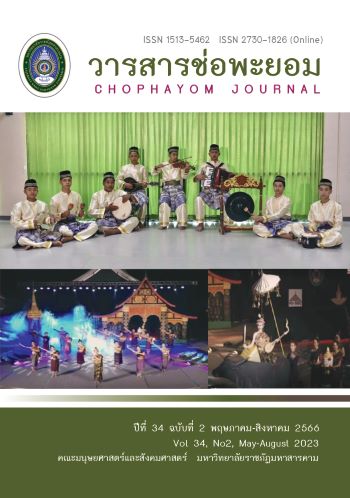The Development of an Attitude Adjustment Program towards Vocational Education for Junior High School Students
Keywords:
attitude adjustment program, vocational educationAbstract
The objectives of this research were 1) to analyze and synthesize guidelines for adjusting attitudes toward vocational education for lower secondary school students, 2) to develop a program for adjusting attitudes towards vocational education for lower secondary school students, and 3) to trial of an Attitude Adjustment Program for Vocational Education for Lower Secondary School Students. This research and development contains 3 phases: 1) Analyze and synthesize the concept of creating a program. 2) Program development, and 3) Trial with an experimental group of 20 junior high school students at Chang Phueak Wittayakhom School who were obtained by Cluster or Area Random Sampling. The research tools were questionnaires, interview forms, and assessment forms. Statistics used were mean, standard deviation and T-test. Research results; 1. There are 3 ways to adjust attitudes: 1) Knowledge, 2) Feelings, and 3) Behavior; 2. The developed program consisted of 8 contents and activities. The process of learning activities consisted of 3 steps: 1) Giving Knowledge, 2) Sensation, 3) Behavioral Adjustment Quality of the program; 3. The results of the program trial showed that after the trial was higher than before. significantly at the .05 level in all aspects: 1) Knowledge, 2) feelings, 3) Behavior. The result of the satisfaction assessment of the program in overall, it was at the highest level ( = 4.67, S.D.=0.49). Keywords: attitude adjustment program, vocational education
References
กรมวิชาการ กระทรวงศึกษาธิการ. (2545). หลักสูตรการศึกษาขั้นพื้นฐาน พุทธศักราชที่ 2545. กรุงเทพฯ: องค์การรับส่งสินค้าและพัสดุภัณฑ์ (ร.ส.พ.).
กรมอาชีวศึกษา. (2547). ทำเนียบสถานศึกษา สังกัดสำนักงานคณะกรรมการการอาชีวศึกษา พ.ศ. 2547. กรุงเทพ: โรงพิมพ์คุรุสภาลาดพร้าว.
เชาวรัตน์ ทุนร่องช้าง. (2558). ผลกระทบของค่าแรงต่อการจ้างงานในภาคอุตสาหกรรมของปะเทศไทย. (วิทยานิพนธ์ปริญญามหาบัณฑิต, มหาวิทยาลัยแม่โจ้).
ณรงค์ พิพัฒนาศัย. (2558). นโยบายรัฐมนตรีว่าการกระทรวงศึกษาธิการประจำปีงบประมาณ 2558. กรงเทพฯ: สำนักงานปลัดกระทรวงศึกษาธิการ.
ปิยะธิดา ปัญญา. (2560). สถิติสำหรับวิจัย. มหาสารคาม: ตักสิลาการพิมพ์.
พันธ์ศักดิ์ ศิริรัชตพงษ์. (2550). ผลสำรวจพฤติกรรมการใช้อินเทอร์เน็ตของวัยรุ่น. สืบค้นเมื่อ 20 กรกฎาคม 2566, จาก http://www.digitalthai.net/tech.
พยุงศักดิ์ จันทรสุรินทร์. (2544). การปฏิรูปการอาชีวศึกษา. เอกสารประกอบคำบรรยายในการประชุมสัมมนาผู้บริหารสถานศึกษา สังกัดกรมอาชีวศึกษา 6 พฤศจิกายน 2544. กรุงเทพฯ: โรงพิมพ์คุรุสภา.
ไพศาล วรคำ. (2561). การวิจัยและพัฒนาโปรแกรมเสริมสร้างแรงจูงใจในการดำรงชีวิตตามหลักปรัชญาของเศรษฐกิจพอเพียง. วารสารครุศาสตร์ มหาวิทยาลัยราชภัฏมหาสารคาม, 15(20), 385-398.
ไพศาล วรคำ. (2564). การวิจัยทางการศึกษา. (พิมพ์ครั้งที่ 13). มหาสารคาม: ตักสิลาการพิมพ์.
วิภาวรรณ อริยานนท์และคณะ. (2550). การศึกษากระบวนการปรับทัศนคติของนักศึกษาในการจัดการเรียนการสอนบูรณาการ วิชาสังคมไทยและมนุษย์กับสุขภาพและสิ่งแวดล้อม. ราชบุรี: วิทยาลัยพยาบาลบรมราชชนนี จักรีรัช.
สุริยะ วงศ์คงคาเทพ. (2550). การพัฒนาอาจารย์เพื่อการสอนแบบบูรณาการ. นครศรีธรรมราช: วิทยาลัยพยาบาลบรมราชชนนี.
อรัญ ซุยกระเดื่อง. (2559). สถิติสำหรับการวิจัย. มหาสารคาม: คณะครุศาสตร์ มหาวิทยาลัยราชภัฏมหาสารคาม.
Boone. E.J. (2002). Developing programs in education. Illinois: Waveland Press.
Maslow, A. H. (1970). Motivation and Personality. New York: Harper and Row.
Montalvo, R. (2007). Urban Secondary School Students Attitudes Toward Physical Education. New York: Teachers College, Columbia University.
Downloads
Published
How to Cite
Issue
Section
License
Copyright (c) 2023 Chophayom Journal

This work is licensed under a Creative Commons Attribution-NonCommercial-NoDerivatives 4.0 International License.






